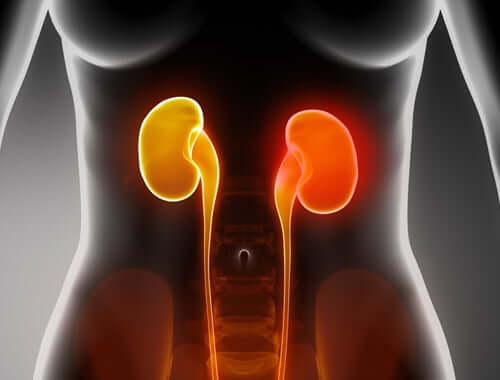Hyperphosphatemia: A Phosphate Imbalance


Written and verified by the doctor Leonardo Biolatto
Hyperphosphatemia occurs when blood phosphorus levels are higher than the normal standard (inorganic phosphorus, that is). Typically, normal phosphorus values are those that range between 2.5 and 4.5 mg/dL. A doctor will usually diagnose hyperphosphatemia when the blood test reports measurements greater than 4.5 mg/dL
Phosphorus fulfills many important functions within the human body. In fact, it’s a macromineral the human body requires to carry out certain metabolic functions it could not perform otherwise.
Most of the phosphorus in our body is contained in the skeletal system. The rest is in the tissue cells and generates energy.
As you can imagine, the bones and teeth are the most affected when there’s either a deficiency or an over-accumulation of phosphorous. Likewise, phosphorus aids calcium and it leads to renal alterations when there’s hyperphosphatemia.
Generally, humans obtain phosphorus from food, especially when we observe a varied diet. Under normal conditions, the excess phosphorus the body doesn’t need goes out through the urine and the fecal matter. The highest sources of phosphorus in terms of food are red and white meats and nuts such as almonds. Dairy products, such as milk, yogurt or cheese are another great source. Some countries have food laws that force industries to enrich certain products with this mineral.
Causes of hyperphosphatemia
Hyperphosphatemia becomes more frequent as the years go by because renal failure is the main cause, which is much more prevalent among the elderly than among younger people. However, there are other causes of hyperphosphatemia:
- Hypoparathyroidism: This is when the parathyroid hormone regulates the metabolism of phosphorus and calcium. In cases of hypoparathyroidism, there’s a low or zero production of this hormone and it can result in a decrease in calcium and an increase in phosphorus in the blood.
- Hypervitaminosis D: In this scenario, there’s a link between vitamin D and calcium and phosphorus regulations. This is either because dysfunction in the parathyroid glands alters vitamin D or because it’s levels in the blood are high due to another cause. Thus, it can increase blood phosphorus.
- High phosphorus consumption: However, this kind of hyperphosphatemia is rare. When the body functions properly, it eliminates any excess urine and feces so they won’t accumulate.
- Prolonged exercise: The strenuous and long-lasting exercises that damage muscles release phosphorus from the muscle cells into the blood.
- Chemotherapy: When a patient undergoes chemotherapy as a cancer treatment, the rapidly dying cells also release their internal phosphorus into the blood and it leads to hyperphosphatemia. We refer to this as tumor lysis syndrome, together with other symptoms that are also the result of chemotherapy.

Symptoms of hyperphosphatemia
When doctors find an elevated level of phosphate in the blood, they often do so more as an incidental event than due to its symptoms. The data appears in most cases because they requested a general blood test to assess other conditions in a given person. People with hyperphosphatemia rarely manifest symptoms due to the elevation of phosphorus in their blood. However, they often consult a doctor due to kidney or muscular problems derived from their hyperphosphatemia.
Usually, the levels of calcium decrease when phosphorus increases its blood concentration and leads to hypocalcemia. When this is the case, the muscles cramp frequently and there are may even be spasms.
The alteration of arterial walls is another long-term consequence. There may be excess phosphorus in the walls of blood vessels, in combination with calcium, and it contributes to arteriosclerosis. Which, in turn, increases the risk of serious cardiovascular problems.

Read also: Nutrition and Kidney Failure – Everything You Need to Know
Treatment
When an underlying disease such as kidney failure or hypoparathyroidism is the reason for hyperphosphatemia, a doctor will proceed to treat it to try to correct it. Likewise, there are three alternatives to treat excess phosphorus:
- A low phosphate diet: This is a diet that doesn’t exceed 1000 milligrams of phosphorus daily. It must be followed under the supervision of a nutritionist.
- Dialysis: Artificial blood filtering supplements kidney function when it’s not at maximum capacity.
- Chelators: There are medications capable of binding with the phosphorus that enters the body along with the food. This is to keep the intestine from absorbing it. Thus, the phosphorus goes back out without reaching the blood system.
Of course, only a doctor can determine which treatment to recommend in each case. Extreme measures aren’t usually necessary, so don’t be alarmed if the results of your blood test indicate hyperphosphatemia. You must always consult a professional who can tell you the most appropriate measures to take.
All cited sources were thoroughly reviewed by our team to ensure their quality, reliability, currency, and validity. The bibliography of this article was considered reliable and of academic or scientific accuracy.
- Sellares, V. Lorenzo. “El reto del control de la hiperfosfatemia en la enfermedad renal crónica.” Nefrología 28 (2008): 3-6.
- Ospina, Camila Andrea Garcia, et al. “Importancia de la hiperfosfatemia en la enfermedad renal crónica, como evitarla y tratarla por medidas nutricionales.” Revista Colombiana de Nefrología 4.1 (2017): 38-56.
- Martín, Antonia García, et al. “Trastornos del fosfato y actitud clínica ante situaciones de hipofosfatemia e hiperfosfatemia.” Endocrinología, Diabetes y Nutrición (2019).
This text is provided for informational purposes only and does not replace consultation with a professional. If in doubt, consult your specialist.








